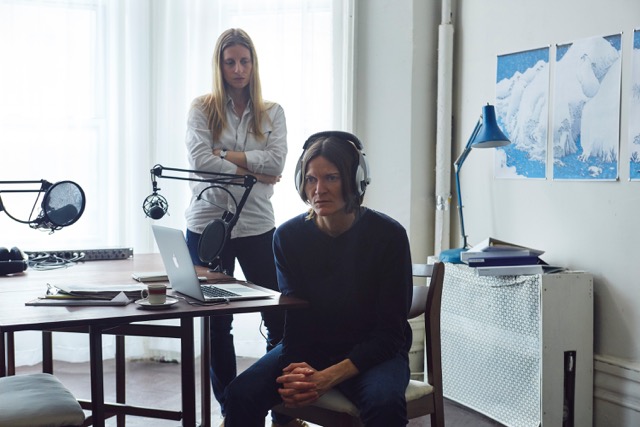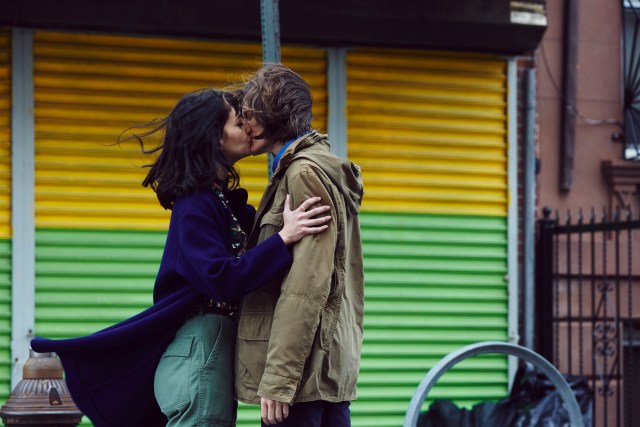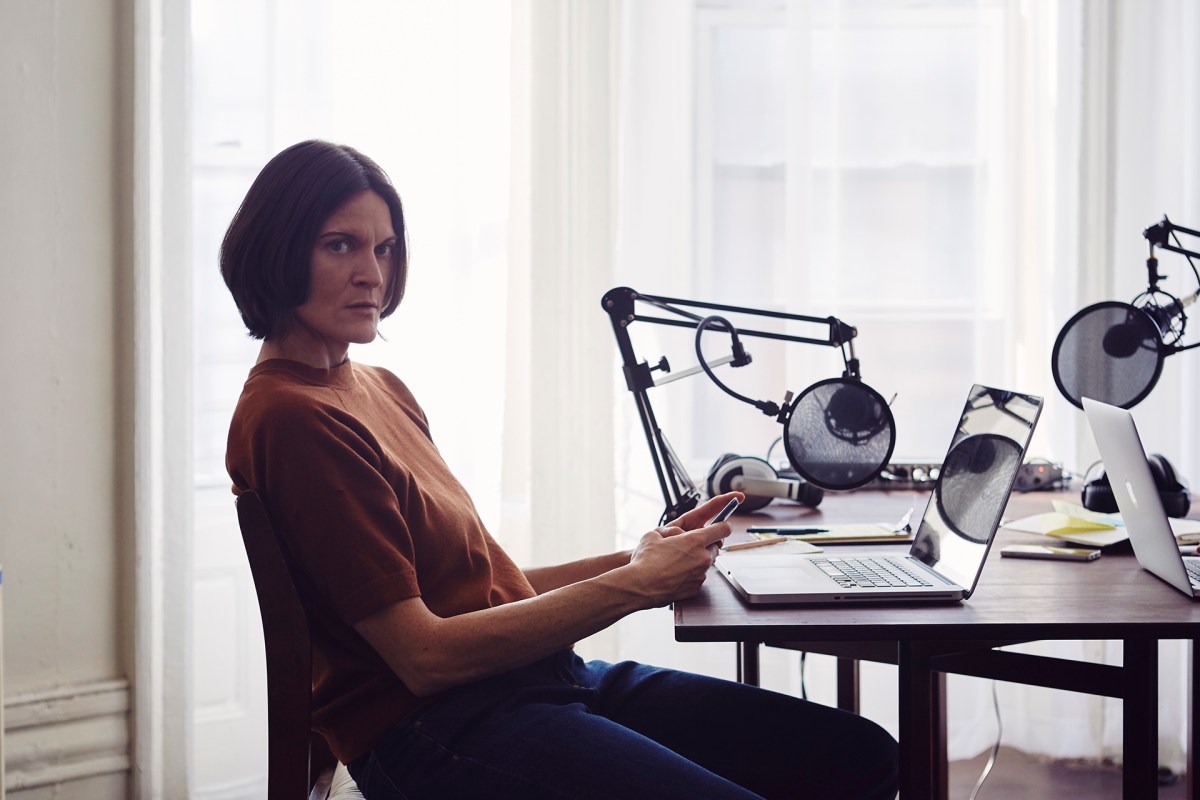Brooklyn-based filmmaker Ingrid Jungermann has been one of the emerging voices in entertainment for the past five years. Her co-produced web series (with Appropriate Behavior’s Desiree Akhavan), The Slope, received plenty of attention during its two-season run. She parlayed that success into a second web series, F to 7th, which earned her a WGA Award nomination. This year, she made her feature film with the debut, Women Who Kill, which won her the best screenplay award in the US Narrative Competition at the Tribeca Film Festival.
The film stars Jungermann as the host of a podcast (with her ex-girlfriend, played by Ann Carr) about female murderers and serial killers. When she meets a new woman (Sheila Vand) at her Park Slope Brooklyn co-op, she finds herself instantly attracted to her, but soon becomes suspicious of her mysterious side and suspects she has a shady past. I spoke with Ingrid about casting the movie, her ’70s film influences, and why New York was the perfect setting for this dark comedy about murder and commitment.
Lesley Coffin (TMS): The day Tribeca announced the film I had an interview with Sheila, so I’ve been looking forward to seeing it for a while. How did you go about casting her in the part? Had you seen Girl Walks Home Alone at Night?
Ingrid Jungermann: We’d been on the lookout for someone for a while. I grew up watching women like Meryl Street and Anjelica Huston and felt at a loss looking for someone to take on that role. I hadn’t seen a lot of younger actors who had that kind of caliber. And I saw Girl Walks Home Alone at night and had that reaction and said “she’s great.” But I didn’t think of her for the part or ask her to come in. Her agency actually sent her reel during casting, and watching it I just knew she would be right.
TMS: It’s interesting because her character seems to come from an entirely different movie and is invading the world of your character in Park Slope. Did you want that character to instantly feel out of place?
Jungermann: It detours from the web series, because I wanted to make a murder mystery and the joke is, Park Slope Brooklyn isn’t a dangerous place, but when I first lived there, I felt out of place. Not only because I’m gay, there are plenty of gay people in Park Slope, but I didn’t have a family and that made me feel like I’m on the outskirts of that community. And that feeling of being an outsider is where Simone sort of came from. How would an outsider feel coming into this world, where you are supposed to be a certain way, and you just can’t make yourself fit in.
TMS: Did you know most of the women who played the group of friends your character’s so close to?
Jungermann: Ann Carr plays Jean, my ex-girlfriend, and I’ve cast her on the web series and wanted to work with her again. And I really wanted to find women who suggested women like Diane Keaton and Anjelica Huston, and Ann reminds me a lot of Diane Keaton, so that’s where my mind went when casting her. She’s an amazing physical comic and we had a rapport from working together before. Terence Nance plays a really funny character and I’ve known about him through another filmmaker, and had him in my head while writing the part. The other roles were cast from auditions, but most of them I knew about. Shannon O’Neill is from UCB. We cast a lot from UCB.

Jean (Ann Carr) stands by as Morgan (Ingrid Jungermann) listens to a taped interview with Josephine “The Clipper” Walker, a serial killer who her clipped her victim’s fingernails before she stabbed them in the heart. (Photo credit: Diane Russo)
TMS: You mention Diane Keaton and Anjelica Huston, both of whom are kind of icons very closely associated with New Hollywood era of the 70s. Were you inspired by any of those films in particular?
Jungermann: That world of comedy’s so interesting. I shared a lot of films with my DP and producers. Woody Allen’s on the list of course. And the Coen Brothers, especially Blood Simple. That film is much darker than ours, but there is something about that film that I really like. That’s their first feature so I was inspired by that too. Claude Chabrol’s a huge influence on me. I stole a few references from his film The Butcher. There is a great, sexy walk and talk in that movie, this long walk while their smoking. And Simone and Morgan share a similar scene. I love the sensuality of that scene and thought Chabrol’s films would have been something Simone loved. I wanted to rewrite my ending last minute and someone suggested I re-watch The Grifters, and that ending kind of nails it, so I was inspired by that as well. So there’s a lot I pulled from.
TMS: What were you dissatisfied with in the original ending?
Jungermann: It felt too neatly tied up. It felt like I’d crossed every T and dotted every I. I literally had a closing montage with all the characters, and it felt kind of a cheesy. So I did away with that and decided to rewrite the ending, but still wanted AN ENDING. Because I think a lot of indie films get lazy by not having a real ending. So I needed an ending that felt like an ending, but left people wondering what would happen to someone months or years later.
TMS: One of the big themes of the movie is fear of commitment and the question Morgan has to face of using her discomfort to justify a break up verses not feeling comfortable or safe with someone. On the realistic, larger scales, have you thought about that conflict in modern relationships and what caused her anxiety?
Jungermann: That internal conflict was the big influence for me. I couldn’t seem to make relationships work long term. I’d hit the two year mark and then just fuck things up. I think we’re taught at such a young age what relationships look like and who we are supposed to like, and the rules of what relationships should be like. And even at a young age, those images started to feel very disturbing and destructive. We watch a fairytales with a white guy and girl, and he’s supposed to carry her off. And that’s not me, or most people, at all. I wanted to take the idea of a romantic comedy formula and talk about the dark side and maybe address some of the fears we all have about relationships. Most of us don’t know how to do them, and if we can accepted that, we’d feel less pressure about finding the one and making relationships last FOREVER. We could just enjoy relationship while we’re in them, whether they last one year or five or ten. I think that pressure affects us in negative ways and ultimately hurts relationships.
TMS: This is actually the second film I’ve seen this year that focuses on fear of commitment within a lesbian relationship and it feels like there is a backlash against the stereotypes about the longevity of lesbian relationships. Were you conscious of the stereotypes the movie would be challenging?
Jungermann: I think about those stereotypes all the time, and my web series are sort of all about a lesbian who doesn’t feel like she’s part of the community she wants to be a part of. And then you think, of course not, we aren’t all going to fit into one group just because of our sexual orientation. But I feel lucky that we’ve gotten to the point where I can make a film like this. There seems to be steps when representing people who are considered different on screen. First there’s this tendency to make fun of them. Then, when more queer filmmakers or filmmakers of color are able to make films and represent themselves, they are concerned with doing more damage and have to present themselves as “the perfect people.” I’m not interested in either of those kinds of representation, I’m only really interested in the humanity and showing that we are all equally screwed up in different way. But I wouldn’t have been able to make a film like this before if not for the films that had come before. I just think we are in a new wave of queer filmmaking where we can comment and make fun of ourselves honestly. That’s the kind of equality I’m invested in…pure equality where we’re all able to admit to be screwed up in lots of different ways.

Morgan (Ingrid Jungermann) and her girlfriend Simone (Sheila Vand) kiss goodbye, unaware that their relationship is about to take a turn for the worse. (Photo credit: Diane Russo)
TMS: I think we’re even seeing that among a lot of female filmmakers in the past 10 years, when they felt an obligation to present women as strong and smart and heroic, and now more and more say they just want to create interesting, complex female characters.
Jungermann: Yeah, and the nuances are interesting. Because in a way, we can end up alienating people if we are just talking about how great we are, but still representing ourselves as one-dimensional characters. When we start to be more interesting and nuanced, that’s when people pay attention and identify with the characters. That’s when you can really open the doors of communication and you stop just preaching to the choir.
TMS: The other thing the movie is sort of commenting on is the Brooklyn, hipster culture. What were you seeing around you that you wanted to comment on?
Jungermann: I don’t know if I’d call Park Slope hipster. I think it’s more privileged culture, where your worries are about your own anxieties, rather than reality. Especially in New York, where we are just in a whirl wind of anxieties and make things happen to ourselves. Things can be going fine, and we still just make things up to worry about.
TMS: Are you interested in crime stories? Do you read about serial killers and murders in your free time?
Jungermann: Yeah, as a kid, my brothers and sister and I and our mom would watch a lot of TV true crime stuff. There’s actually a little homage to a true crime, TV movie from the 80s that’s I watched with them. There were all these TV movies and miniseries about people like Ted Bundy and Jeffrey Dahmer. And at a young age I watched a bunch of horror films I probably shouldn’t have been allowed to watch. So there’s an attraction to darkness at a young age, and for some reason, true crime happened to be a family favorite. We’d talk about it and read books and watch all the movies. I don’t know where that bonding came from.
TMS: It’s great to see Annette O’Toole in the part of the serial killer, and she’s a great actress who I feel like I don’t see on screen as much. But I’ve loved her in films like Smile and Cat People so it’s nice to see her get a meaty role. What inspired that casting?
Jungermann: She’d appeared on my web series too and I just fell in love with her. She played my mom on the web series, a Jehovah witness trying to get me to come back to men. She’s very funny, and this was very different. I think I described her as a female Hannibal Lecter. I knew her range and she’s so great in the part.
TMS: Up next, do you want to do another web series, make another movie, move to TV? What are your plans going forward?
Jungermann: I want to do it all. Those each appeal to different parts of my brain. The web series was completely different from the movie, and now I’m writing a TV pilot. TV seems very team oriented and collaborative, which seems nice, because not everything will be up to me. For the feature, you have to be in charge and it’s a long term commitment. And the web series is very much a do-it yourself environment, but you are doing it really fast.
TMS: Did you work on other film or TV projects before you started making your own material?
Jungermann: I started in theater, acting and then directing. And at some point we realized a lot of the roles for women are kind of lame, so we started writing our own and did all-female mixed media variety shows. I’d write and direct and be in them. And then I appeared in a couple of shorts. And at that time, my girlfriend Desiree and I were assigned to make a short for NYU grad school, and we wrote, directed, and starred in that, which really lead me down this path.
TMS: Do you think writing and directing, and for you acting, are three separate jobs or do you treat them as one big job?
Jungermann: I don’t think I know the difference because I haven’t done just one for a very, very long time. Writing-directing feels like one thing, because I can’t write without visualizing and I can’t direct without wanting to write. So for me they feel very connected, and acting just feels intertwined. I’m more drawn to writing and directing more than I am to acting at this point, but those two things seem so inner-connected, I’m not sure how I’d feel just doing one. I think I’m most inspired on its own, by writing, so I think I can imagine writing something and letting someone else direct. I’m doing that with the TV pilot and I really like the person directing it.
Lesley Coffin is a New York transplant from the midwest. She is the New York-based writer/podcast editor for Filmoria and film contributor at The Interrobang. When not doing that, she’s writing books on classic Hollywood, including Lew Ayres: Hollywood’s Conscientious Objector and her new book Hitchcock’s Stars: Alfred Hitchcock and the Hollywood Studio System.
—The Mary Sue has a strict comment policy that forbids, but is not limited to, personal insults toward anyone, hate speech, and trolling.—
Follow The Mary Sue on Twitter, Facebook, Tumblr, Pinterest, & Google+.









Published: Apr 29, 2016 11:50 am